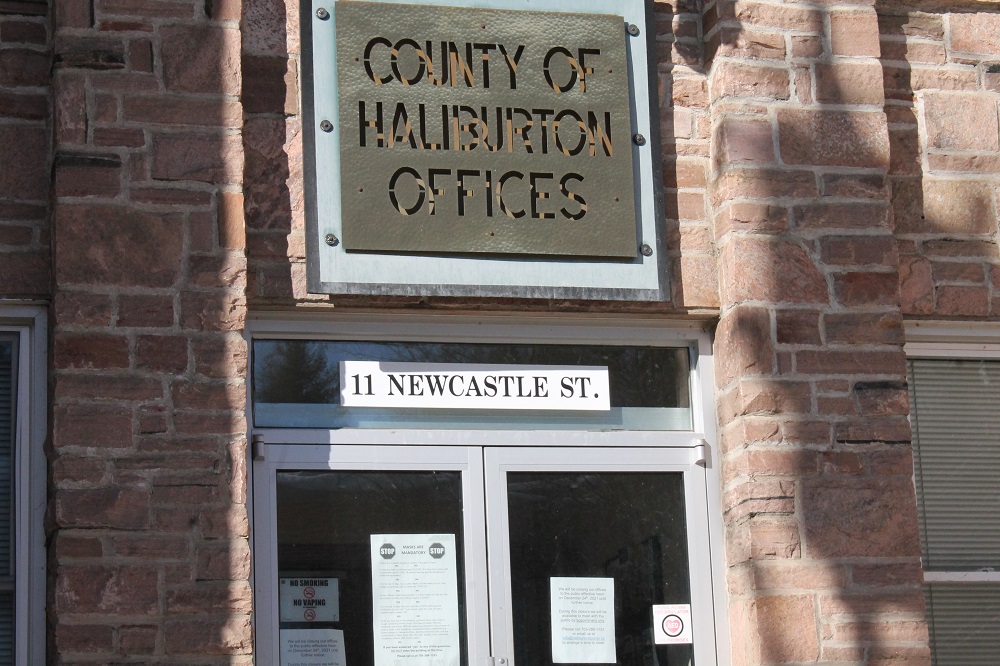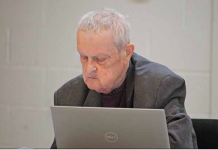Ontario’s Ombudsman has rapped the County of Haliburton’s knuckles over an April 27 closed door meeting that Paul Dubé said should not have been held in-camera.
Dubé issued his ruling this month over complaints filed with his office. He said the council meeting, which dealt with the pending closure of the Minden emergency room, “did not fit within the closed meeting exceptions in the Municipal Act.”
Council called the special meeting, inviting then HHHS CEO Carolyn Plummer and board chair David O’Brien, “to gather more information… and to attempt to reverse or delay the closure,” Dubé said. “We were told that an in-camera discussion was planned because the County hoped the HHHS representatives would be more willing to have a full and frank discussion with council in closed session than in public,” the ombudsman added.
He said the County claimed exceptions in sections 239(2)(g) and 239(2)(i) of the Act. Section 239(2)(g) allows a municipality to discuss a matter in which a council, board, committee, or other body may hold a closed meeting under another Act. Section 239(2)(i) is an exception for information supplied in confidence to the municipality by a third party.
According to the closed session minutes, and the people Dubé’s team interviewed, Plummer and O’Brien had an opportunity to speak to council about the decision. O’Brien explained HHHS’ rationale and shared information about staffing levels, labour relations, and bed capacity at the two County hospitals. Dubé said O’Brien and Plummer also provided a plan to ensure patients could access emergency services at Haliburton hospital following the closure.
Warden: ‘learning experience’
Several council members asked questions and expressed opinions, Dubé said, with most disappointed and disagreeing with the decision, and decrying a lack of consultation. Councillors questioned the plan to accommodate patients at Haliburton hospital and requested HHHS delay or reverse its decision, he said.
After Plummer and O’Brien left, Dubé said council continued the in-camera discussion. Chief paramedic Tim Waite talked about the potential effects on ambulance service levels and said he’d reached out to the Ministry of Health about additional funding.
The discussion then turned to possible legal action the County could seek to prevent or delay the closure, although council decided not to take legal steps at that time. Dubé said council then discussed public statements it would make on the matter, with staff told to prepare a press release. Council then came back into open session.
County responsibility
Dubé said with regards to matters permissible under another Act, the exemption has limited application “because very few pieces of legislation contain exceptions that allow a municipality to hold closed meetings.”
He added councillors and staff could not explain why the exception had been cited. “The clerk shared that the County may have assumed that legislation exists that permits the HHHS board to hold closed meetings, which also applied to council. However, the County could not cite the legislation that it believed permitted the closed meeting.,” Dubé said.
To be transparent and avoid confusion, he said a resolution to move into closed session should include a clear reference to the relevant legislation and provision. “My review did not identify any legislation that permits council to discuss the emergency room closure in closed session. Accordingly, council was not entitled to rely on this exception for its in-camera discussion on April 27,” the Ombudsman said.
As for council citing information supplied in confidence by a third party, Dubé said O’Brien told his office information given to council was not considered confidential by HHHS. Dubé said Waite’s information about the ministry was not supplied in confidence either. Dubé did say that when it came to the legal discussion, council was within its right to be in-camera.
The Ombudsman said while the County was dealing with a community in crisis “the open meeting rules continue to apply.
“The open meeting requirements set out in s. 239 of the Municipal Act permit the public to observe the political process. I encourage the County to continue to strive to carry out their business in as transparent and open a manner as possible during all council meetings,” Dubé said.
Warden Liz Danielsen said the meeting was called at an “extremely difficult time. Unfortunately, given the challenges we were facing, as well as our desire to understand an unforeseen hardship placed on our community, our discussions with the board chair and HHHS CEO went beyond what was permissible under the act.”
She felt the Ombudsman was “somewhat” sympathetic to the situation. “However, as always, issues like this become a learning experience for us all.” She said council accepted the finding and recommendations and had directed staff to update their procedural bylaw and provide training to council and staff “to ensure this situation will not be repeated.”
Richard Bradley issued a statement on behalf of The Save Haliburton County Emergency Health Group. They said, “it is extremely disappointing, as we now look back to a meeting that occurred five weeks before the June 1, 2023 closure of the Minden emergency department, where information that all the stakeholders of Haliburton County could have, would have, and should have, had access to was not made available to us.”





